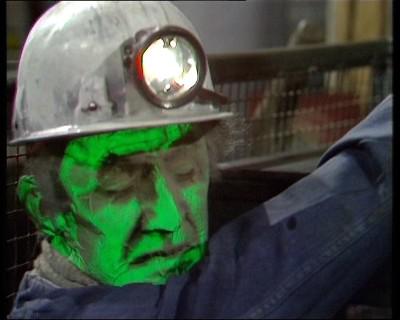Written by Robert Sloman and Barry Letts
Directed by Michael Briant
And so ends the three-season combination of the Doctor and Jo Grant. I have to say, this one is a mixed bag for me. I think it serves as a very nice capstone to the celebratory tenth season, and the departure of Katy Manning certainly gave a poignancy to Jon Pertwee’s performance. It’s very clear that this was the beginning of the end for the Third Doctor.

This serial has an environmental message that would be more subtle if it reached out of the television and beat your head into the nearest wall. What I find unusual is that Jo’s departure is tied directly to her interest in these matters, and thus strong feelings for Dr. Jones, who leads a movement of scientifically-trained researchers and protesters.
There is a certain irony that comes with watching this serial in 2011, when the high price of oil and the debate over the cause and long-term effects of recent climate change has focused attention on several options for “clean energy” and such. Why so ironic? Because at one point, early in the story, Dr. Jones discusses some radical solutions to the world’s energy and pollution problems. All of them are the exact same “innovative” technologies being discussed today, about 40 years later.
I confess that the plot is as bit on the nose for me, in terms of the era’s penchant for social commentary. At first, it seems straightforward enough. Global Chemicals is, of course, the Great Industrial Evil, and its toxic sludge has combined with a strange sort of fly to create mega-larvae (and eventually, a very silly mega-fly). But then it is revealed that something is controlling the executives, driving them to such immoral ends.
It is a computer system that has gained enough intelligence to take over completely (hilariously called BOSS; I kid you not), thus taking the corporate drive towards profit-at-all-costs to a new extreme. Not only is this a commentary on the supposed detached and dehumanized attitude of corporate management, but also the dangers of automation. BOSS feels like a massive retread of WOTAN from the First Doctor’s “The War Machines”, so it doesn’t help that BOSS is inferior in presentation and motivation.
The whole thing is so baldly villainous that I suspected, upon hearing the voice of BOSS, that this was intended to be a system installed by the Master to wreak havoc on Earth. But alas, it is not so, and the end result is quite uninspiring. The writers also telegraph the solution to the “green death” infection by having Dr. Jones work with exotic fungi.
That brings up the romance between Jo and Dr. Jones, which leads to a remarkably quick engagement at the end of the story. The writers make it very clear, from Jo’s first bumbling scene in Dr. Jones’ lab, that there is a purposeful parallel to Jo’s initial days with the Doctor. And of course, Dr. Jones has a personality very similar to a young Doctor. The Doctor himself often refers to himself by the alias Dr. Smith, so the familiar Smith/Jones bit is right there to be seen.
I suppose this is meant to mitigate Jo’s sudden interest in environmental concerns, which is meant to explain why she would run off to join Dr. Jones’ crusade, since it pretty much wasn’t part of her character in the previous three seasons of material. And it glosses over the uncomfortable notion that Jo considered the Doctor a father figure, and thus finds herself strongly attracted to a younger man with the exact same qualities. It conforms a bit uncomfortably to certain outmoded psychological notions.
For my part, I think it would have been more interesting to emphasize, over the course of the season, what comes up often in this serial: the fact that the Doctor’s freedom from exile means that his presence on Earth is less and less necessary as time passes, and Jo’s growing independence is taking her on a path away from the Doctor’s wanderlust. Tying Jo’s desire for a different life to an engagement (to a man so similar to the Doctor, no less!) doesn’t seem like a move towards independence and self-discovery. Sure, Jo leaves the show happy, but I can’t help but think that a more modern take would have explored the psychology of her choice with more nuance.
The departure of Jo Grant opens the door for the introduction of one of the most iconic companions in the history of the series: Sarah Jane Smith. I’ll be interested to see how that works out, because this actually would have been a logical place to end the Third Doctor’s run. As it stands, his association with UNIT doesn’t make much sense, and for all that, UNIT is a pale reflection of its former potential glory.
One final note: I try to overlook the period-appropriate low-rent composite shots, because I’m well aware of the budget constraints, but this is some of the worst effects work that I’ve seen from the classic era. This era is apparently notorious for the bad composite work, but this is gets into moments of pure hilarity.
Writing: 1/2
Acting: 2/2
Direction: 1/2
Style: 1/4
Final Rating: 5/10

